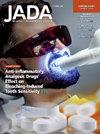Oral manifestations of Crohn disease managed with ustekinumab
IF 3.1
2区 医学
Q1 DENTISTRY, ORAL SURGERY & MEDICINE
引用次数: 0
Abstract
Background
The authors reviewed a case involving the orofacial manifestations of Crohn disease (CD) in an adolescent whose treatment was ultimately managed with a newer class of biologic drug agent, ustekinumab (Stelara, Janssen Biotech). CD is a chronic inflammatory condition affecting the gastrointestinal tract that often causes extraintestinal complications. The underlying etiology of CD involves genetic, environmental, and local factors. Orofacial manifestations of CD include gingivitis, mucosal tags, aphthous ulcerations, labial swellings, cobblestoning, and linear ulcers of the oral vestibules.
Case Description
A previously healthy 12-year-old boy presented with painful, constant, diffuse oral ulcerations. His diagnostic and laboratory testing supported a diagnosis of CD. The patient was then treated with budesonide (Entocort, Perrigo Company), prednisone (Deltasone, Pfizer Inc), and infliximab infusions (Remicade, Janssen Biotech). Later, he had high levels of anti-infliximab antibodies and inadequate control of his orofacial lesions. He then began taking a different class of biologic medication, ustekinumab. After initiation of ustekinumab, both his oral and intestinal manifestations markedly improved.
Practical Implications
Collaboration between the treating dentist and treating gastroenterologist is recommended for management of the orofacial manifestations of CD. This may lead to an improvement in the patient’s prognosis and quality of life. Ustekinumab is an anti-p40 antibody that inhibits interleukins 12 and 23. It is a newer biologic medication, and its use has been increasing in the pediatric population with CD. Its use is typical after failure of an antitumor necrosis factor drug, like infliximab.
用ustekinumab治疗克罗恩病的口腔表现:1例报告。
背景:作者回顾了一例涉及Crohn病(CD)的口腔面部表现的青少年患者,其治疗最终使用了一类新的生物药物,ustekinumab (Stelara, Janssen Biotech)。乳糜泻是一种影响胃肠道的慢性炎症,经常引起肠外并发症。乳糜泻的潜在病因包括遗传、环境和局部因素。乳糜泻的口腔面部表现包括牙龈炎、粘膜标签、口腔溃疡、唇肿、鹅卵石样结石和口腔前庭线状溃疡。病例描述:一名原本健康的12岁男孩,出现疼痛、持续性、弥漫性口腔溃疡。他的诊断和实验室检测支持CD的诊断。患者随后接受布地奈德(恩托可特,Perrigo公司)、强的松(德塔松,辉瑞公司)和英夫利昔单抗(Remicade,杨森生物技术公司)输注治疗。后来,他有高水平的抗英夫利昔单抗抗体和控制他的口面部病变不足。然后,他开始服用另一类生物药物——ustekinumab。在开始使用ustekinumab后,他的口腔和肠道表现均有明显改善。实际意义:建议治疗的牙医和治疗的胃肠病学家合作来处理乳糜泻的口腔面部表现。这可能会改善患者的预后和生活质量。Ustekinumab是一种抑制白细胞介素12和23的抗p40抗体。它是一种较新的生物药物,在患有乳糜泻的儿科人群中使用越来越多。它通常在抗肿瘤坏死因子药物(如英夫利昔单抗)失败后使用。
本文章由计算机程序翻译,如有差异,请以英文原文为准。
求助全文
约1分钟内获得全文
求助全文
来源期刊

Journal of the American Dental Association
医学-牙科与口腔外科
CiteScore
5.30
自引率
10.30%
发文量
221
审稿时长
34 days
期刊介绍:
There is not a single source or solution to help dentists in their quest for lifelong learning, improving dental practice, and dental well-being. JADA+, along with The Journal of the American Dental Association, is striving to do just that, bringing together practical content covering dentistry topics and procedures to help dentists—both general dentists and specialists—provide better patient care and improve oral health and well-being. This is a work in progress; as we add more content, covering more topics of interest, it will continue to expand, becoming an ever-more essential source of oral health knowledge.
 求助内容:
求助内容: 应助结果提醒方式:
应助结果提醒方式:


